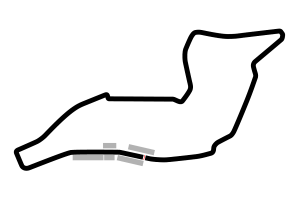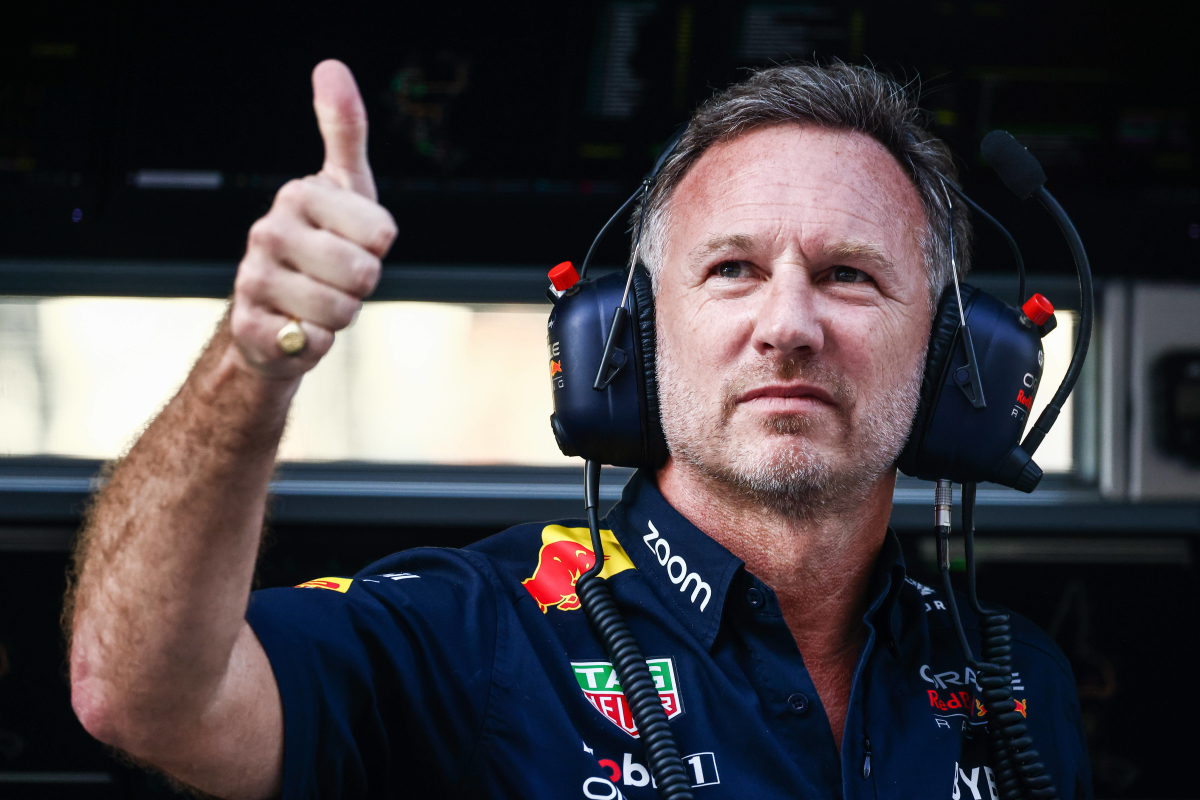Christian Horner's rise in Formula 1 has been nothing short of remarkable. From ambitious driver and junior team founder to championship-winning team principal, we explore the defining moments in a meteoric rise.
Horner has become synonymous with Red Bull Racing and F1 brilliance. The ever-outspoken team principal has been at the helm of the Milton Keynes-based outfit since its inception in 2005.
READ MORE: Journalist claims Horner ‘messages’ leaked from anonymous email account
But his journey in motorsport began long before the roar of Red Bull engines echoed through the grid. From his early days as a driver competing in Formula 3000, to founding junior category team Arden, to guiding Red Bull to multiple world championships followed by an investigation into misconduct which he was later cleared of, Horner's career has been a rollercoaster ride of audacious risks, victories, and gut-wrenching setbacks.
Today, we dive into the defining moments which have shaped his F1 odyssey, moments which have cemented his place as one of the most influential figures in the sport.
READ MORE: F1 team principals: Who is in charge of each team in 2024?
Horner's biggest moments in F1
The birth of Red Bull: It all started in 2005 when co-founder of Red Bull energy drinks Dietrich Mateschitz decided to take a bold gamble. The Austrian billionaire bought the struggling Jaguar team at the end of the 2004 season, and transformed it into Red Bull Racing.
The 31-year-old Christian Horner took charge, becoming the youngest team principal in F1. This marked the dawn of a new era, one in which Horner's sharp business sense, prior experience with team management and strong belief in his new team would play a pivotal role.
Signing Adrian Newey: In 2006, a year after the team's debut in F1, Horner lured the genius Adrian Newey away from McLaren, a move that would rewrite the team's trajectory and solidify Horner's legacy.
Newey, already a legend after designing championship-winning cars for Williams and McLaren, wasn't just another signing; he was the missing puzzle piece for Red Bull.
Under his meticulous hand, the team transformed from plucky upstarts to championship contenders and then, ultimately, to dominant champions.
First steps on the podium: The early years weren't easy for Red Bull. Despite flashes of brilliance, consistent success remained elusive. However, in 2009, the tide began to turn. At a rain-soaked Chinese GP, Sebastian Vettel, a young gun championed by Horner, secured Red Bull's first-ever victory.
Vettel and Mark Webber helped the team claim second place in the constructors' championship by winning six races between them and finishing second and fourth in the drivers' championship respectively.
From underdogs to champions: The 2010 season saw Red Bull emerge as a true force to be reckoned with. With Vettel at the wheel and Horner's strategic leadership, the team challenged the top teams for the crown.
At the season finale in Abu Dhabi, Vettel entered the race third in the drivers’ standings, 15 points behind championship leader Fernando Alonso and seven behind Red Bull teammate Webber.
But in a dramatic turn of events, Ferrari and even Red Bull made mistakes in their pit strategies, which caused Alonso and Webber to struggle in the middle of the field.
The German then finished 10 seconds ahead of Lewis Hamilton, securing the first of his four championships and Red Bull's first ever constructors' championship, while Webber managed to climb the grid and finish in third.
It was surely a historic moment that marked the arrival of a new power in F1, orchestrated by the ever-ambitious Horner.
Dynasty days: 2010 was the beginning of Red Bull's golden era. Under the leadership of Horner and the visionary technical genius of Newey, the team embarked on a historic reign, securing an unprecedented quadruple of both drivers' and constructors' championships between 2010 and 2013.
Horner was then appointed an Officer of the British Empire in 2013 following this remarkable achievement.
Red Bull's rise and fall: Following Webber's retirement at the end of the 2013 season, Horner gambled on another young talent, Daniel Ricciardo. The Aussie brought a new dynamic to the team, winning three races and finishing third in the standings ahead of Vettel who left the team at the end of 2014.
In 2015, Ricciardo became team leader alongside Daniil Kvyat, but the team secured only two podium finishes and an eighth-place finish as Red Bull and Renault struggled to adapt to the turbo-hybrid era.
The Verstappen era begins: Max made his debut at the 2015 Australian GP for Toro Rosso, aged only 17 years. Recognising the Dutchman's raw talent, Horner brought him into the Red Bull fold after just four races of his second season in 2016, replacing Kvyat.
The partnership proved to be a match made in heaven. Verstappen's fearless driving, coupled with Horner's support, propelled Red Bull back into championship contention. Verstappen and Ricciardo finished the 2016 season in fifth and third place respectively, while the team finished second behind the dominant Mercedes.
Breaking the Mercedes monopoly: After seven years of Mercedes dominance in the drivers' championship, 2021 saw Verstappen snatch the drivers' title off of Hamilton in the controversial season finale in Abu Dhabi.
The following year, Horner and Red Bull dethroned the Silver Arrows after eight years of dominance, winning their first constructors' championship since 2013.
These championship battles, with their dramatic twists, will forever be etched in F1 history, and Horner played a critical role in orchestrating the team's remarkable comeback.
Red Bull's most dominant season yet: In 2023, Red Bull outdid themselves with their best season yet. They clinched their second consecutive constructors' championship, amassing a staggering 860 points - the highest ever scored by a team in a single season.
Verstappen, who had already established himself as a dominant force, won his third title in a row, totalling 575 points and a record 19 victories in 22 races.
With two race wins and 285 points, Sergio Perez finished second in the drivers' standings, giving the team its first one-two championship finish.
In December 2023, Horner was awarded a CBE in King Charles III’s New Year Honours List for his services to motorsport - a testament to the lasting impact that he has made behind the scenes in shaping the sport we now know today.
However, little over a month later, Red Bull launched an investigation into his conduct after a female colleague made allegations of 'inappropriate behaviour' against him. Horner staunchly defended himself and denied all of the allegations levelled against him.
He was cleared of any wrongdoing on February 28, 2023, the eve of the 2024 F1 season.
Now, as Red Bull continue to be a dominant force, Horner's legacy will undoubtedly continue to grow, leaving an indelible mark on the ever-changing world of F1.
READ MORE: F1 Schedule 2024: Full calendar with all you need to know about every grand prix
Related






 GP AUSTRALIA
14 - 14 Mar
GP AUSTRALIA
14 - 14 Mar

 GP CHINA
21 - 21 Mar
GP CHINA
21 - 21 Mar

 GP JAPAN
4 - 4 Apr
GP JAPAN
4 - 4 Apr

 GP BAHRAIN
11 - 11 Apr
GP BAHRAIN
11 - 11 Apr

 GP SAUDI ARABIA
18 - 18 Apr
GP SAUDI ARABIA
18 - 18 Apr

 GP USA
2 - 2 May
GP USA
2 - 2 May

 GP ITALY
16 - 16 May
GP ITALY
16 - 16 May

 GP MONACO
23 - 23 May
GP MONACO
23 - 23 May

 GP SPAIN
30 - 30 May
GP SPAIN
30 - 30 May

 GP CANADA
13 - 13 Jun
GP CANADA
13 - 13 Jun


























 Grand Prix of Austria 2025
Grand Prix of Austria 2025  Grand Prix of Belgium 2025
Grand Prix of Belgium 2025  Grand Prix of Hungary 2025
Grand Prix of Hungary 2025  Grand Prix of Azerbaijan 2025
Grand Prix of Azerbaijan 2025  Grand Prix of Singapore 2025
Grand Prix of Singapore 2025  Gran Premio de la Ciudad de Mexico 2025
Gran Premio de la Ciudad de Mexico 2025  Grande Prêmio de São Paulo 2025
Grande Prêmio de São Paulo 2025  Qatar Grand Prix 2025
Qatar Grand Prix 2025  Grand Prix of Abu Dhabi 2025
Grand Prix of Abu Dhabi 2025 